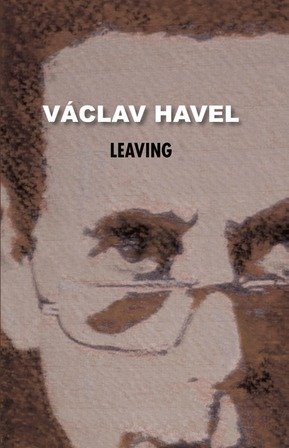Leaving
The first play written by Václav Havel after his final term as President of The Czech Republic. Inspired by Lear and The Cherry Orchard, Havel writes of a man forced to leave the state owned villa he has called home for years, when his time in public office has ended. A drama of ethics and politics with, as always, a touch of the absurd. Translated by Havel’s most prolific translator, Paul Wilson.
158 pages
$14.95
ISBN 0-9770197-8-0
Introduction to Leaving
I have seen four productions of Leaving, with four different directors, in three different countries.
For a play this new, that leaves me in rare company. Two were in English (one in Philadelphia, one in London), and two were in the Czech Republic (one in Prague, one in Brno). But each production gave me a unique perspective on the work, a perspective which deepened with each successive viewing.
I have another, personal connection to Leaving. Václav Havel wrote some of it while he was in New York, attending Untitled Theater Company #61’s Havel Festival, which I curated. The festival included every play Havel had ever written, and I see tiny elements of all of them within its text. Another, even more personal connection: a very small, very offstage character is named after me.
So of course, I have no choice but to love the play, for those reasons alone.
But it is a difficult play. To me, Havel’s life and his full body of work are an ever-present prelude throughout. The main character, Rieger, is obviously yet another imperfect mirror of himself, much like Vaněk or the host of other Havellian leads from his previous plays. Which is not to say Rieger is Havel, that sort of reductionism serves no purpose but to satisfy amateur psychologists who want to see the play as a method of self-analysis (true perhaps, but also a common truth about most art). The essential characteristic of Rieger is that he is a once great political leader, now fallen.
An understanding of Havel may be necessary to understand the true tragedy of that occurrence. The typical Havel play, whether it be The Memo or Largo Desolato or Garden Party (aka Office Party) has as its protagonist an idealist who, in the course of the play, is eventually stripped of all his ideals. They are a warning about the slippery slope that one can follow just by allowing small lies into one’s life, one by one. The plays may attack Communism, but the target of their fiercest satire is the dissident who rationalizes himself into a state of capitulation with the state.
In Leaving, Rieger is the state, and although he lives in a post-Communist era, he has clearly rationalized himself out of his original ideals. We never see him as the idealist he once was, though we hear of it. Instead, we witness his slow downward slide, with his ascent being an assumed event.
For Czechs or others who know Havel well and associate Rieger with Havel, that period of idealism is assumed. For those new to Havel’s work, the task of deciphering Leaving may be more complex.
Herein, of course, lies the director’s task, the task of interpretation. Each production I saw was interpreted vastly differently. They interestingly took on the characteristics of the director or the city around them. In London, the play felt like it could be a political drama on the BBC. In Philadelphia, Rieger had the dissolute feeling of a once-respected member of congress now plagued by scandal. The Czech versions had a more intellectual bent to their portrayals and veiled references not only to Havel’s personal history but also to his sometime political rival (and successor as Czech president), Václav Klaus.
The more I watched, the more I realized I preferred the interpretations that took a step away from reality. Leaving can feel deceptively realistic, but it is important to remember that Havel wrote in the absurdist tradition. The stylized repetitions, the direct quotations from Lear or The Cherry Orchard, the voiceover of Havel’s authorial musings, they all are an extension of a very particular tradition. Integrating that all into a single style may be a difficult task, but fortunately, we have the example of Havel’s previous work to guide us.
This all presents a challenge, an exciting one for a director to tackle. I have seen that challenge met in very different ways (I deliberately avoid direct evaluation, knowing some of the artists involved). If I should ever direct Leaving, it will be my job to solve those problem for my particular production.
But for now, I think it is better to end my thoughts in a Havellian way, not with an answer, but with a question.
—Edward Einhorn
